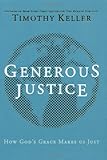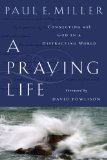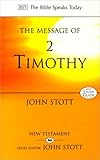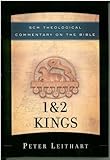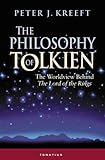 I heard the news of John Stott’s death only a couple of days after I started re-reading this Romans commentary. It was one of the first of the Bible Speaks Today series that I read, and for all the numerous things he will rightly be remembered for, I feel especially thankful for his contributions to and editorship of this series. In this volume, as with his other commentaries, John Stott models a truly evangelical approach to Scripture. He comes reverently to the Bible, believing it to be the very Word of God, eager to learn, ready to engage with difficulties of exegesis and doctrine, and most of all, expecting to encounter God through it.
I heard the news of John Stott’s death only a couple of days after I started re-reading this Romans commentary. It was one of the first of the Bible Speaks Today series that I read, and for all the numerous things he will rightly be remembered for, I feel especially thankful for his contributions to and editorship of this series. In this volume, as with his other commentaries, John Stott models a truly evangelical approach to Scripture. He comes reverently to the Bible, believing it to be the very Word of God, eager to learn, ready to engage with difficulties of exegesis and doctrine, and most of all, expecting to encounter God through it.
A book like Romans of course is a daunting task for any Bible expositor. So many notable expositors and scholars have already tackled it in great depth. And there are many tricky theological issues it raises. What is “the righteousness of God”? What is the correct understanding of the doctrine of election? What place does the people and nation of Israel have in God’s ongoing plan? Who is the conflicted man of Romans 7? Was Junia an apostle? Whatever positions you take, you certainly can’t please all of the people all of the time in a commentary on Romans.
Stott starts with a preliminary essay, which includes several pages devoted to the New Perspective on Paul. He is to be commended on two counts for including this. First, that he pays any attention to it at all. By my reckoning, it is only the likes of Tom Wright that have really brought the NPP into the general evangelical consciousness in recent years. Yet Stott clearly saw back in 1994 that this was going to become a debating point, and tackled it head on. Second, the way he seeks to correctly understand and fairly represent the opinions of the likes of Stendahl, Dunn and Sanders is also commendable. In some places I felt he articulated their points better than they did, such is his gift for clarity. Having said that, he does not go along with the conclusions of the NPP. I have previously blogged about John Stott’s take on the New Perspective here.
One key interpretive issue in Romans is the role and purpose of the “law”. Stott explains that “For justification we look to the cross, not the law, and for sanctification we look to the Spirit, not the law.” However, he wants to disagree with those who deny the law a place in the Christian life. “The moral law remains a revelation of God’s will which he still expects his people to ‘fulfil’ by living lives of righteousness”. He attempts to find a balance between the errors of legalism and antinomianism by saying “Legalists fear the law and are in bondage to it. Antinomians hate the law and repudiate it. Law-abiding free people love the law and fulfil it.” Do Christians have to obey the law? Yes and no … “not because the law is our master and we have to but because Christ is our husband and we want to.” The Spirit empowers us to keep the law – our freedom from the law is not freedom to disobey it.
As he ponders what the “righteousness of God” is, he notes three explanations often given. Is it (1) a divine attribute (2) a divine activity (his saving intervention), or (3) a divine achievement (the righteous status we are given)? He asks why we have to choose – “it is at one and the same time a quality, an activity and a gift”. He then expands on this to define the righteousness of God as “God’s righteous initiative in putting sinners right with himself by bestowing on them a righteousness which is not their own but his.”
He takes some time to defend the biblical concept of the “wrath of God”, from those who find this doctrine objectionable (again pre-empting a debate that has gained much momentum more recently in evangelical circles). “God’s wrath is his holy hostility to evil his refusal to condone it or come to terms with it his just judgment upon it.” The human predicament is not only sin, but God’s wrath upon sin.
Stott’s take on the identity of the conflicted man in Romans 7 is interesting. He cannot see it as a believer, since “a slave to sin” cannot be a Christian, and yet neither can he accept the unbeliever explanation. He concludes that it is a “regenerate” man, but not one who has the Holy Spirit. For Stott this leaves him with no other option than saying that the ‘I’ is an Old Testament believer. Stott of course strongly rejects the Pentecostal view of a subsequent baptism in the Spirit for a believer (as he makes clear in his comments on Rom 8:14-17), so cannot entertain the possibility that this ‘I’ could be a believer fighting sin in human strength alone without the empowering of the Spirit.
Stott has occasion to touch on subjects such as election and predestination, and while he seems to accept a Calvinist position, he prefers to refer to the concept of “antinomy” – two seemingly conflicting truths being held together – such as divine sovereignty and human responsibility. I like his suggestion that “the perseverance of the saints” should be renamed “the perseverance of God with the saints”.
As he tackles the subject of Israel, Stott is eager to underscore the importance of evangelism for all people, including the Jews. He includes a brief “manifesto of evangelism” that summarising the teaching of Romans on evangelism.
Overall, despite not necessarily agreeing with his every viewpoint, I would say this is another excellent work and valuable for anyone personally studying or teaching through Romans. There are of course the works by Douglas Moo and Tom Schreiner which I would recommend to those wanting to go into more exegetical depth, but Stott should not be underestimated and there is plenty of well argued and thought-provoking material in here to help shape your understanding of this important New Testament book.

